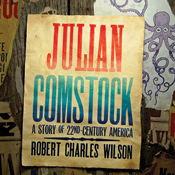
 Julian Comstock: A Story of the 22nd Century
Julian Comstock: A Story of the 22nd Century
By Robert Charles Wilson; Read by Scott Brick
21 Hours – [UNABRIDGED]
Publisher: Macmillan Audio
Published: 2009
Themes: / Science Fiction / Government / Aristocracy / History / Politics / Global Warming / Civilization / Theocracy /
The United States of America has changed. Global warming fears have come to pass, Christian groups have become a stronger part of the government (practically its own branch, called The Dominion), aristocracy has ascended because fewer and fewer have access to so much. The average citizen in this 22nd century view of the future have taken a step backward. The scientific past has retreated into myth, and superstition rules the day.
In short, Robert Charles Wilson has taken a particular view of what the United States is and has taken it to extremes in “if this should continue” science fiction tradition. The characters do not feel futuristic – instead they feel historical. Like Firefly in a way, the characters are straight from the 19th century. This creates a very interesting juxtaposition of time: A possible future that’s really a look at the present, but with characters that feel historical. Sci-Fi Wire quotes Wilson on this:
The past regarding the present from the future—that’s a literary effect only science fiction can achieve, and that’s what I was aiming for, a kind of simultaneous triple perspective. We think of the past as quaint and the present as mundane and the future as, well, futuristic—but so did our great-grandparents, and so will our great-grandchildren. ‘All times have been modern,’ as the French composer Nadia Boulanger said.
The novel is told by Adam Hazzard, a friend of Julian Comstock, who is aristocrat (the Comstock family has held the Presidency for years and years). Hazzard tells us right up front that he’s writing this biography of Comstock because Comstock has become a great man.
The first scenes have the two as young men looking through a pile of discarded books. They take what they can carry, but Comstock gives a specific book to Hazzard; a history of manned exploration of the Moon. Hazzard doesn’t believe such things actually happened, but accepts the book anyway, and wonders.
From there, Hazzard uses events like this one to show readers the life of Comstock, but everything is colored through Hazzard’s point of view. In a way, the book is like a Sherlock Holmes novel, but Wilson has created a much more interesting character in Hazzard than Doyle ever did with Watson.
Scott Brick takes full advantage of the Hazzard character, and does well with the 19th century sensibility of all the characters. This book has a whole lot of detail and a whole lot of lengthy conversation between the main characters about various subjects. Brick keeps it interesting, like he always does. We even get to hear him speak French when the characters spend time in Montreal.
This novel is rich and draws on a rich tradition. A Canticle for Leibowitz, The Postman, and Earth Abides all leap to mind, but this isn’t a homage or a retelling of those books. This is a story that looks at the present in a way that only science fiction can.
Posted by Scott D. Danielson